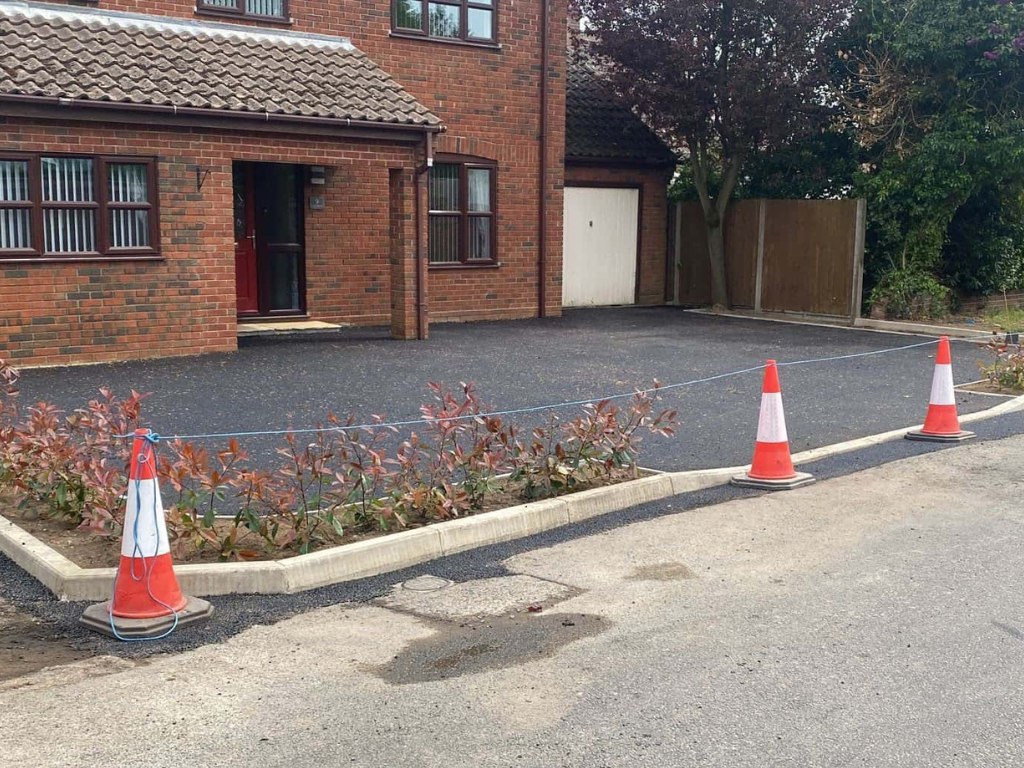Why Retail Parks and Offices Are Choosing Tarmac Over Other Surfaces
In commercial spaces such as retail parks and office complexes, the choice of surface material for car parks, access roads, and pathways is critical. Businesses need a durable, cost-effective, and low-maintenance solution that enhances both aesthetics and functionality. In recent years, tarmac has become the preferred choice over alternatives such as concrete, block paving, and gravel. This shift is driven by tarmac’s durability, affordability, and ability to withstand heavy usage, making it ideal for commercial environments.
The Advantages of Tarmac for Retail Parks and Offices
Cost-Effective Installation
One of the primary reasons businesses opt for tarmac is its affordability. Tarmac is significantly more cost-effective to install compared to concrete or block paving. The materials and labour required for tarmac surfacing are lower, making it an attractive option for large-scale commercial areas.
High Durability and Strength
Retail parks and office complexes experience constant vehicle traffic, requiring a surface that can withstand heavy loads without deteriorating. Tarmac is highly durable and resistant to wear and tear, making it an excellent choice for car parks, access roads, and driveways. It can endure high footfall and vehicular pressure without cracking or shifting.
Quick and Efficient Installation
Unlike other surfacing materials, tarmac can be laid and set quickly, minimising disruption to business operations. Concrete surfaces require extended curing times, whereas tarmac hardens much faster, allowing car parks and roads to be used within a short period after installation.
Low Maintenance Requirements
Tarmac surfaces require minimal maintenance compared to block paving or concrete. If damage occurs, repairs are straightforward and cost-effective. Minor cracks and potholes can be quickly filled, extending the lifespan of the surface without requiring a full replacement.
Enhanced Safety Features
Safety is a key concern for retail parks and office premises. Tarmac provides excellent skid resistance, reducing the risk of slips and accidents for both pedestrians and vehicles. It also allows for clear road markings, such as designated parking spaces, pedestrian crossings, and directional signs, improving traffic management within the premises.
Weather Resistance
The British climate can be harsh on outdoor surfaces, with frequent rain, frost, and temperature fluctuations. Tarmac’s weather-resistant properties make it a reliable choice for commercial areas. It does not crack easily under freezing conditions and is less prone to surface erosion compared to gravel or paving stones.
Why Tarmac Is a Better Alternative to Other Surfaces
Tarmac vs Concrete
- Flexibility – Tarmac is more flexible than concrete, reducing the likelihood of cracks caused by ground movement.
- Cost – Tarmac is typically more affordable in both initial installation and long-term maintenance.
- Installation Speed – Concrete requires longer curing times, whereas tarmac sets quickly.
Tarmac vs Block Paving
- Durability – Block paving can become uneven over time, whereas tarmac maintains a smoother, more even surface.
- Maintenance – Weeds and moss often grow between block paving joints, requiring regular cleaning, while tarmac is low maintenance.
- Load-Bearing Strength – Tarmac can handle heavier vehicles without shifting or breaking.
Tarmac vs Gravel
- Stability – Gravel surfaces can become uneven and require regular replenishment, while tarmac remains solid and level.
- Ease of Use – Vehicles and pedestrians find tarmac easier to navigate compared to loose gravel.
- Weather Resistance – Tarmac is less affected by heavy rain and wind, which can displace gravel and create maintenance issues.
The Growing Popularity of Tarmac in Commercial Spaces
More businesses are recognising the long-term benefits of tarmac for their commercial premises. Its ability to handle high traffic volumes, withstand extreme weather conditions, and provide a clean, professional finish makes it an ideal choice for retail parks, office complexes, and industrial estates. Additionally, the availability of coloured and decorative tarmac options allows businesses to customise their premises without compromising on durability.
Conclusion
Tarmac is becoming the preferred surfacing material for retail parks and office complexes due to its affordability, durability, and ease of maintenance. Compared to concrete, block paving, and gravel, tarmac provides a cost-effective and long-lasting solution that enhances safety and functionality. With professional installation, tarmac surfaces can provide years of reliable service, making them a smart investment for commercial properties.
If you are considering tarmac for your business premises in Burwell, professional driveway and surfacing specialists can help create a durable and visually appealing solution. Contact us today for expert advice and high-quality installation.
Call us on: 01638 597 108
Click here to find out more about Burwell Driveways
Click here to complete our contact form and see how we can help with your driveways.

